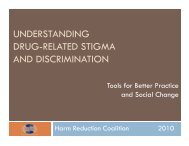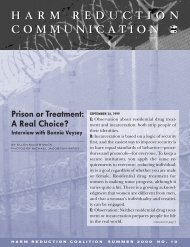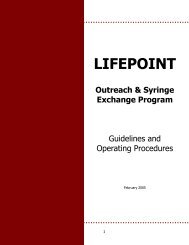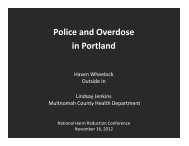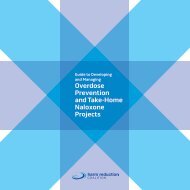9th - Harm Reduction Coalition
9th - Harm Reduction Coalition
9th - Harm Reduction Coalition
You also want an ePaper? Increase the reach of your titles
YUMPU automatically turns print PDFs into web optimized ePapers that Google loves.
<strong>9th</strong><br />
National <strong>Harm</strong> <strong>Reduction</strong> Conference<br />
FROM PUBLIC HEALTH TO SOCIAL JUSTICE<br />
years of research and services with young adults at risk for HCV, HBV and HIV. We have developed a Replication Manual for<br />
the UFO Model and training and TA products. The UFO Model is modular and adaptable to communities, and our products<br />
are available for free online (www.ufomodel.org).<br />
Pamela DeCarlo is the Project Director for UFO Presents! and has over 20 years’ experience as a writer and editor, synthesizing<br />
scientific reports and articles into concise and understandable materials for non-academic service agencies and the general<br />
public. She uses non-traditional methods such as new media to foster bi-directional communication between scientists and<br />
consumers of research.<br />
Co-authors: Alice Asher RN MSN CNS, Caycee Cullen, Nickie Tilsner, Giuseppe Cavaleri, Alya Briceno MPH, Kimberly Page PhD<br />
MPH<br />
Deletis, Robert, Independent, Danbury, CT<br />
roberpman@comcast.net<br />
The Effects of Exposure Response Prevention on Reducing Addictive Cravings<br />
Exposure Response Prevention is a behavior therapy technology that reduces a person’s pre-disposition to respond to a set<br />
of stimuli. For example, ERP has been used to treat phobias and compulsions by exposing the person to the phobic situation<br />
or thing (stimuli set) and then preventing them from executing their dysfunctional response.<br />
ERP has been applied to the problem of substance abuse. One of the key hurdles a person must overcome is to remain<br />
substance free is to refrain from using when exposed to stimuli (people, places, & things) formerly conditioned to their<br />
substance abuse. Failure to behaviorally ignore such conditioned stimuli is the primary cause of relapse among substance<br />
abusers. The range of stimuli conditioned as triggers of substance abuse is varied and individualized. There are, however,<br />
common triggers. These are the sensory stimuli associated with the substance of choice, it acquisition and preparation for<br />
use. Secondly, there is the typical use setting, such as bars, time of day or special event. Finally emotional stressors while<br />
more individualized are another frequent trigger. ERP Therapy helps a client extinguish his substance seeking behavior &<br />
impulses by systematically exposing them, in a controlled environment, to a sampling of the three sets of stimuli. It also<br />
reconditions the client’s cognitive self-talk over a period of sessions. ERP is an eclectic therapy that is another piece of the<br />
recovery process. It is compatible with community support groups like AA, NA, etc.<br />
Robert DeLetis, CASAC for the past 15 years. Mr. DeLetis is an international and nationally certified alcohol and drug counselor<br />
(CADC). He is also the co-author of Kill the Craving, a book that introduces Exposure Response Prevention (ERP) to professionals<br />
and their clients. Mr. DeLetis has been utilizing this process to help the residential and outpatient clients to fight their addictions<br />
for the past 14 years. He has developed training seminars, in-service trainings, as well as created a full professional ERP kit. Over<br />
the years Mr. DeLetis has been employed in the criminal justice field, as a probation officer, and as a mental health counselor.<br />
Denning, Patt, <strong>Harm</strong> <strong>Reduction</strong> Therapy Center, Oakland, CA<br />
pattdenning@gmail.com<br />
The unspoken Politics of Drug Treatment: How Drug Policy Mirrors and Creates Drug Treatment in the United States<br />
For too long drug treatment in the United States has hidden under a veil of arrogant self-righteousness. Questioning the<br />
principles or practices of the Minnesota Model of treatment constitutes blasphemy and often results in being accused of<br />
being an enabler, or worse, a murderer. While public health professionals and policy advocates have pushed an agenda of<br />
harm reduction and other pragmatic and humane strategies, drug treatment has been allowed to sit in the shadows doing<br />
business as usual…the disease model, 12 Step, abstinence only, confrontational style of getting people “clean and sober”.<br />
This workshop will detail the need for a nationwide advocacy and training effort to transform the drug treatment system<br />
30



